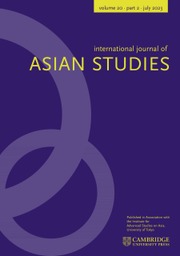Article contents
THE 1890S KOREAN REFORMERS' VIEW OF JAPAN – A MENACING MODEL?
Published online by Cambridge University Press: 10 December 2004
Abstract
This paper explores the nuances of the perceptions of Japan by Korea's reformist press of the late 1890s, chiefly by Tongnip sinmun (1896–1899, edited by So Chaep'il and Yun Ch'iho). The main finding of the paper is that, despite the Christian reformists' avowed allegiance to the USA as their ideal model of “civilization”, Japan was taken as a practical model – an example of how a fellow East Asian country, which was supposedly “30 years ago even more backward than Korea”, could succeed in “civilizing” itself. At the same time, reformists' nationalist reaction against domineering “colonial” behavior of the Japanese inside Korea often took the form of an appeal to “international” – read “American”/“European” – “standards of civilization”. The conclusion the study of some of the earliest forms of Korea's Westernizing nationalism leads us to is that the “Occidentalist” worldview of the early Christian nationalist reformers was a complex, multi-layered and often self-contradictory phenomenon, in which “oppressive” features are not easily distinguishable from “liberational” ones. Its key treatment – the prettified, essentialized picture of the “Occident”, believed to be the only “true”, “ideal” civilization – could work “oppressively” as it put Korea's traditional culture in the position of “barbarism” to be exorcized, while looking “emancipatory” when used as the yardstick for criticism of Japanese encroachment.
- Type
- Research Article
- Information
- Copyright
- © Cambridge University Press 2004
- 1
- Cited by




